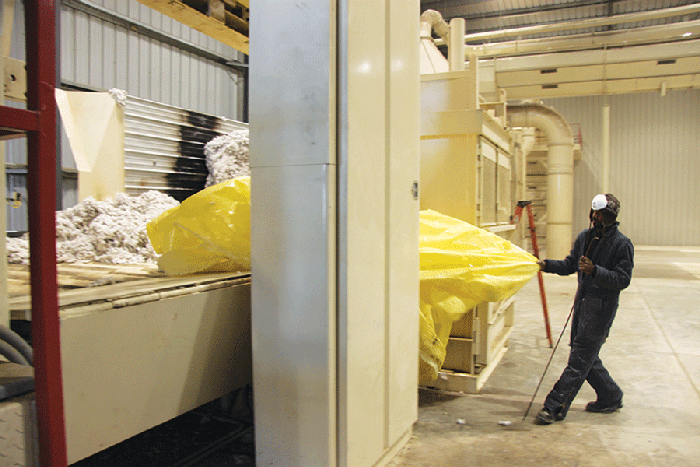
While “multiple regulations in the federal pipeline” continue to be a concern for the U.S. ginning industry, “there is hope that the new Trump administration will seek to undo some of the more onerous regulations,” says David Blakemore, Campbell, Mo., ginner, who is the new president of the National Cotton Ginners Association.
“We also hope Congress will use the Congressional Review Act to undo some of these regulations,” he said at the annual meeting of the Southern Cotton Ginners Association at Memphis.”
The Occupational Safety and Health Administration (OSHA) “has been more aggressive,” he says. “Over the last few years, the agency has been using the General Duty Clause to cite gins for hearing violations and combustible dust.”
Cotton gins, Blakemore points out, are covered under OSHA’s Agriculture Standard, not the General Industry Standard. But, he says, “It’s not unusual for some OSHA inspectors to enter a gin and assume that it’s covered under the General Industry Standard.” In one instance, he says, an attempt was made to cite a Texas gin by calling a press pit “a confined space hazard.”
Last fall, in his home state of Missouri, he says, “a gin had multiple violations, with the General Duty Clause being used to cite the gin, with several of the violations being cited three times.”
There are often “wide disparities,” Blakemore says, between OSHA offices and how they interpret regulations. He urged ginners to let the SCGA of NCGA review any OSHA citation before agreeing to settle or pay anything.

Over the past few years, OSHA “has been more aggressive” in citing gins for violations under the General Duty Clause, says David Blakemore, president of the National Cotton Ginners Association.
A continuing concern for the industry, he says, are ongoing activities associated with the Food Safety Modernization Act and the Animal Food Rule. During the Food and Drug Administration’s educational presentations and development of regulations for the act, “we assumed the FDA would exempt low risk commodities held in facilities such as grain elevators and warehouses that store only raw agricultural commodities intended for further distribution or processing.
“But in the FDA’s final rule for Preventive Controls for Animal Food that was published in 2015, a specific response is included that addresses cotton gins. This rule states that all gins are exempt from Subpart B, which is the Current Good Manufacturing Practices requirement. That’s exactly what we wanted.”
The rule also includes, Blakemore says, a definition of “farm” that results in a distinction between ownership structures of gins, “and this distinction is where the problem begins.”
Gins that are farmer owned, which may be defined as 51 percent farmer owned, or gins that are structured as cooperatives, would be exempt from the rule’s requirements. On the other hand, privately owned gins would be subject to the rule requirements of Subparts C and E.
Implementing Subparts C and E “would be nearly impossible to implement without Subpart B, from which all gins are exempt,” he says.
Blakemore says Steve Hensley, with the National Cotton Council’s Washington office, met with the FDA “to further press our case that all gins should be exempt from C and E sections of this rule. Steve came away with two disconcerting details. First, the FDA believes that the application of heat to dry seed cotton could be considered a process, and second, it believes that what would be required of gins would be minimal.”
Comments were recently submitted, he says, by the National Cotton Council, the NCGA, and eight other state and regional gin associations, including SCGA. The comments were in response to the FDA’s guidance document, “Classification of Activities as Harvesting, Packing, Holding, or Manufacturing/Processing for Farms and Facilities.”
The document is part of directions for cotton and other industries on how to comply with the FDA’s Food Safety Modernization Act’s final rule for Preventive Controls for Animal Food. “We have been meeting and arguing with the FDA about compliance with this rule since 2015.”
In comments submitted to the FDA, Blakemore says, “We argued that treating cottonseed differently from grain, by subjecting it to subparts C and E of the rule, was not a correct decision — that the rule was categorizing cottonseed’s risk to health as different from grain, such as corn.
“The industry also pointed out that the FDA’s illogical decision to regulate gins based on ownership structure or type was not germane to the rule. The agency’s argument isn’t applicable to the cotton ginning industry, because the activities in a cotton gin — whether farmer owned or non-farmer owned — can all be classified within either harvesting activity or storage of a raw agricultural commodity category.
“NCGA and the National Cotton Council will continue to work to insure that gins are treated equitably under the Food Safety Act, and we have requested that FDA staff visit a cotton gin to see the ginning process.
“Rest assured,” Blakemore says, “that the National Cotton Ginners Association will monitor the implementation or proposed changes to any regulations that can affect ginners.
About the Author(s)
You May Also Like




